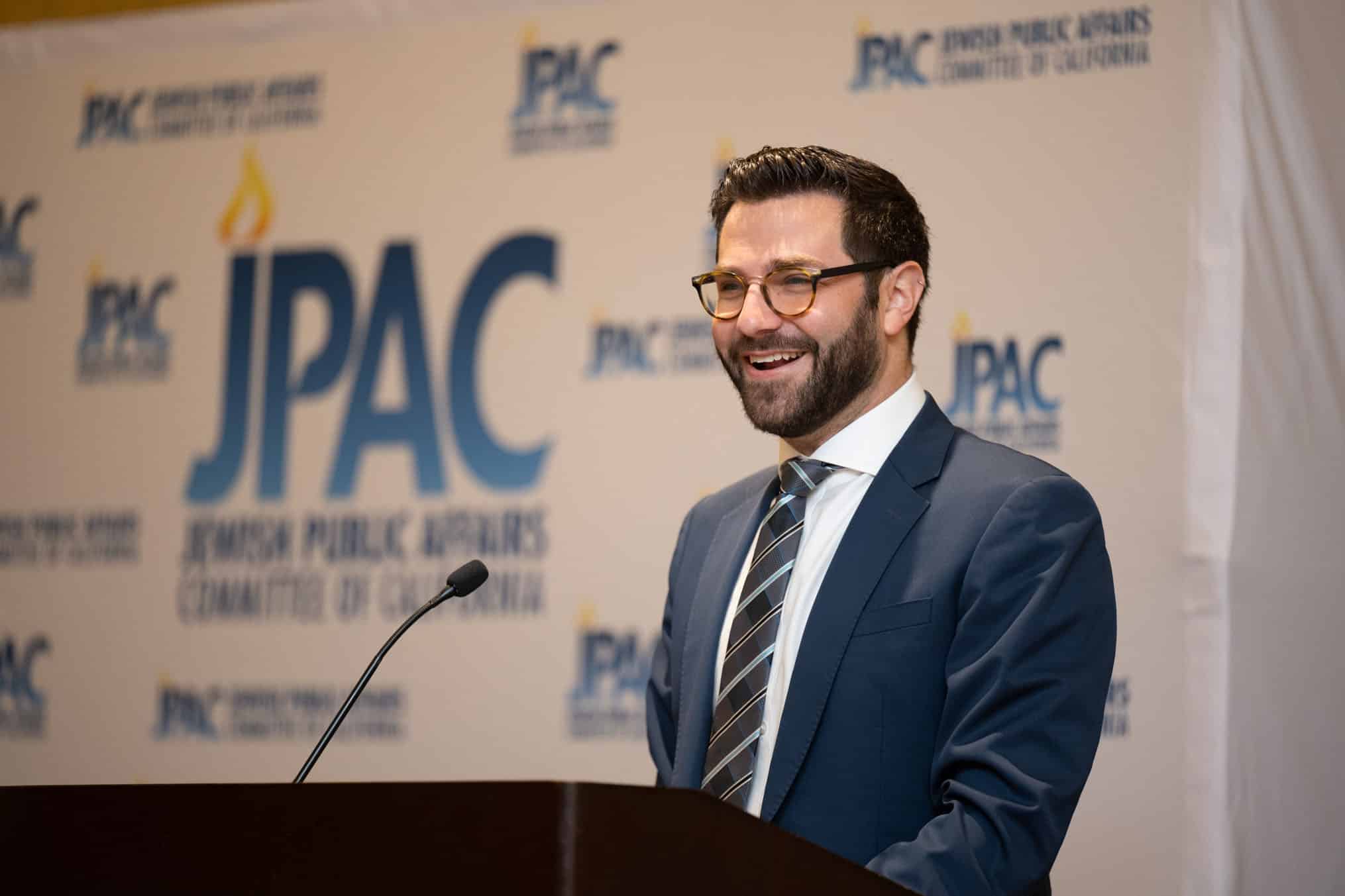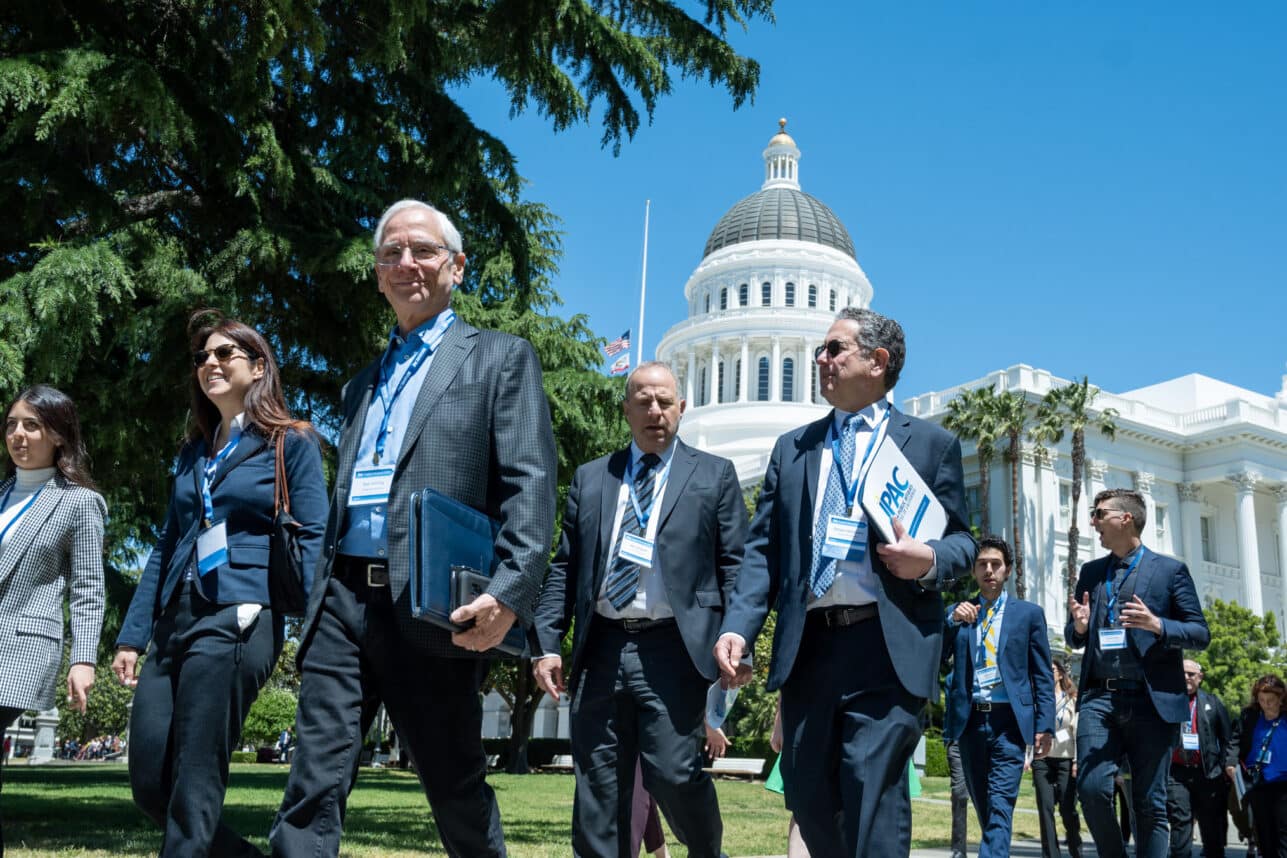 JPAC Executive Director David Bocarsly addresses Capitol Summit (Photo courtesy David Bocarsly)
JPAC Executive Director David Bocarsly addresses Capitol Summit (Photo courtesy David Bocarsly) The Jewish Public Affairs Committee (JPAC) of California promoted an “ambitious” policy agenda at their 2023 Capitol Summit on May 9-10.
The summit, which was sponsored by the Anti-Defamation League (ADL) and The Diane and Guilford Glazer Foundation, took place at the Sheraton Grand Sacramento Hotel. JPAC Executive Director David Bocarsly told the more than 300 conference attendees that last year, JPAC succeeded in securing $140 million from the state budget toward their legislative priorities and helped pass 15 bills. This year, the organization scored meetings with 103 legislative offices and added eight organizations to the JPAC coalition, putting the coalition’s total at 32 organizations. Bocarsly hailed it as the “largest single state coalition” of Jewish organizations in the country. Additionally, a quarter of the state legislature was present on the opening night of the conference.
“Our community is realizing more and more how much power there is at the state level,” Bocarsly said.
JPAC’s policy agenda, which Bocarsly described as “ambitious,” included lobbying for $80 million in security grants to protect nonprofit organizations from hate crimes, $3 million toward Holocaust and genocide education for K-12 schools and $44 million for domestic and sexual violence prevention programs. JPAC also supported bills making it easier to build affordable housing on property owned by faith institutions and nonprofit colleges, increasing the CalFresh (California food stamps) minimum from $23 to $50 and extending the timeframe for critical case management services for new refugees beyond the federal government’s 90-day limit.
“We take them on because they are a clear representation of our community’s values,” Bocarsly said.

Lobbying groups organized by JPAC visited state legislators at their offices on May 10 promoting the organization’s legislative agenda. American Jewish Committee Los Angeles Regional Director Richard S. Hirschhaut, who led one of the lobbying groups, told the Journal: “It’s so important to put a face to the Jewish community and to be able to relate one-on-one with members of the [state] Assembly. We have found them to be receptive to the legislative initiatives that JPAC is putting forward because they ultimately reflect universal human values, and this is a public service that the Jewish community is doing by being here in Sacramento.”
The state budget was a theme throughout the conference, as the state is suddenly facing a $31.5 billion deficit after having a nearly $100 billion surplus the year before. CalMatters columnist Dan Walters told conference attendees that the state revenue fluctuates every year because California’s burgeoning budget and progressive tax structure have caused the state to become more reliant on a handful of wealthy taxpayers who generate their income from investment earnings. “[It’s] difficult to estimate from one year to the next how rich people are doing on their investments,” Walters said, pointing out that during the COVID-19 pandemic in 2020, the state assumed that the economic downturn that year would result in lower revenue so the state budget was lower. But that projection turned out to be inaccurate, as the state’s wealthiest people “did not suffer from COVID-19’s economic impact”; consequently, there was a surplus, according to Walters. The 2022 surplus prompted the state government to balloon the budget, but this ended up being a miscalculation, as the Federal Reserve’s higher interest rates resulted in lower earnings for the state’s wealthiest taxpayers, Walters said, thus resulting in less revenue than expected.
Shortly after the summit, California Governor Gavin Newsom (D) proposed $10 million in his budget to nonprofit security grants on May 12. “At a time where the Governor had to make significant cuts to his agenda, proposing new funding for this program is a major statement of support for our community,” Bocarsly said in an email to summit participants. “And it’s a testament to the impact you made at the Summit. It’s clear to me that the show of strength we exhibited this week influenced the Governor’s decision to support our community despite making cuts elsewhere.”
The issue of rising antisemitism was also brought up multiple times throughout the summit, as multiple speakers noted that the latest figures from the Anti-Defamation League — released just before the summit started — showing that that there were 518 instances of antisemitism in California in 2022, a 41% increase from the year before. ADL Center on Extremism Vice President Oren Segal pointed out that there were six extremist-related killings in California in 2022 and that the number of white supremacist propaganda incidents such as dropping flyers on people’s private property and unfurling banners across freeways “have exploded across California.” Segal attributed the rise in antisemitism to “hate, conspiracy theories, and disinformation” being “increasingly amplified in online spaces” and to influencers like rapper Kanye West, who has “more followers than Jews on the planet.” State Assemblymember Isaac Bryan (D-Culver City) argued that the spike in hate occurred during the two years of the COVID-19 pandemic and suggested that “we’ve got to force each other to have these conversations about equity” and inclusion.
Dan Schnur, a political communications professor at USC, UC Berkeley and Pepperdine and a Journal columnist, told attendees that the latest ADL figures don’t teach “us anything we don’t already know” but said that the way to address it is for the community to “make new friends” and “move forward together.” He then praised the California Legislative Jewish Caucus for doing “a phenomenal job in forging relationships” with other communities.
The Jewish Caucus received plaudits throughout the summit from other speakers. Assembly Speaker Anthony Rendon (D-Lakewood), one of the summit’s keynote speakers, lauded the caucus for becoming “an incredible force not only within our caucus but in our legislature.” State Senator Nancy Skinner (D-Berkeley) told attendees that the Jewish Caucus would counter “anti-abortion forces” citing God as reason to ban abortions by saying “that is not what our religion teaches.” Assemblymember Mia Bonta (D-Oakland), the wife of State Attorney General Rob Bonta (D), said that the caucus has had a “you lead, we have your back” mentality toward issues like reproductive rights and gender affirming care.

Assemblymember Scott Wiener (D-San Francisco), who co-chairs the Jewish Caucus, told attendees that “we face so many challenges as a community” and that “we know antisemitism is there and our job as a caucus to have the community’s back.” Wiener’s fellow co-chair, Assemblymember Jesse Gabriel (D-Woodland Hills), declared that while “it is an especially complicated time for our community,” the community is “united.” He added that it’s “gratifying” that the caucus and community “is a big part of the policy conversation in Sacramento.”
Bocarsly told the Journal “What makes JPAC so special is the diversity of our coalition, which was put on display at JPAC Capitol Summit. We convened over 300 Jewish community leaders of all backgrounds, representing a beautiful cross-section of California’s Jewish life. Our delegation included leaders of dozens of major Jewish organizations that are working to combat antisemitism and hate, advance civil rights, and provide a wide range of social and human services to vulnerable Californians. And we all traveled to our State Capitol to uplift a bold, impactful, and unified policy agenda. It was clear that the 103 legislative offices we met with were inspired by our commitment to our Jewish values and our ability to come together across differences. I could not be more proud of this growing movement, and I know that the impact of this year’s Summit will reverberate in the halls of Sacramento long beyond our two days together.
“Special thanks to the leaders of the Senate and Assembly — Pro Tem [Toni] Atkins (D-San Diego) and Speaker Rendon— to co-chairs —Assemblymember Jesse Gabriel and Senator Scott Wiener — and the entire Legislative Jewish Caucus, and to all of our amazing legislators and experts who addressed the Summit and made it so special,” he added.





















 More news and opinions than at a Shabbat dinner, right in your inbox.
More news and opinions than at a Shabbat dinner, right in your inbox.